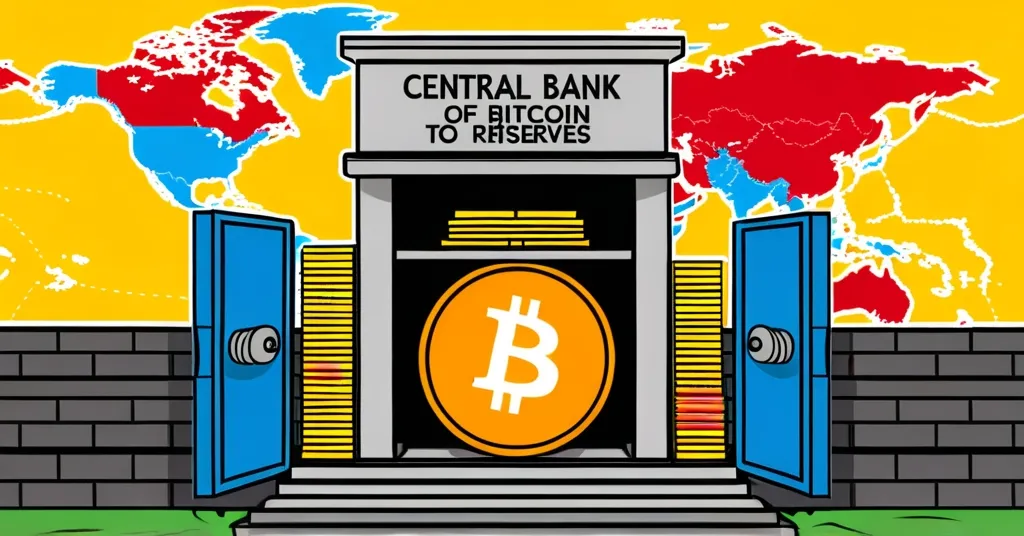Czech National Bank Explores Bitcoin Reserves Amid Global Crypto Trend

Czech Central Bank Considers Bitcoin for Reserves Amid Global Trend
The Czech National Bank (CNB) is weighing the option of adding Bitcoin to its currency reserves, signaling a shift in traditional financial strategies. This consideration aligns with a broader global trend where countries are exploring digital assets as part of their financial portfolios.
- CNB considers Bitcoin for reserves
- Focus remains on low inflation and financial stability
- Global trend towards Bitcoin in reserves
- Czech Republic fosters crypto-friendly environment
CNB Governor Aleš Michl has Bitcoin on his mind, but he’s keeping it cool and sticking to traditional assets for now. “I have Bitcoin in my head but our strategy now is low inflation, financial stability,” Michl stated. The CNB’s portfolio currently includes a mix of gold, stocks, bonds, and cash deposits. They plan to increase their gold reserves from 50 tons to 100 tons over the next three and a half years, aiming for about 5% of their total assets by 2028. “We will have 30% of stocks, we have bonds, we have cash deposits, and we have gold. So that’s it,” Michl added, emphasizing a cautious approach towards cryptocurrencies.
The allure of Bitcoin is undeniable. Over the past year, it’s been on a tear, soaring by 131%, while gold, the traditional safe haven, managed a mere 30% rise. This remarkable performance has turned heads not just in the Czech Republic but globally. Countries like Brazil, Japan, and Russia, along with regions in North America, are either exploring or have already initiated Bitcoin reserve strategies. In Brazil, lawmaker Eros Biondini proposed establishing a national Bitcoin reserve. In Japan, Satoshi Hamada questioned the government about similar initiatives. Russia’s State Deputy Anton Tkachev urged considerations for a Bitcoin reserve, and the Vancouver City Council in Canada approved a motion to convert part of its financial reserves to Bitcoin. In the U.S., states like Texas, Alabama, and Pennsylvania are moving toward Bitcoin reserve bills. It’s as if Bitcoin is the modern-day equivalent of a Swiss bank account, but with fewer yodelers.
The Czech Republic is not just dipping its toes into Bitcoin but is also creating a splash in the crypto pool. The Czech Parliament recently approved an amendment that exempts capital gains tax on Bitcoin and other crypto assets held for more than three years, effective from January 1, 2025. This move underscores the country’s commitment to supporting the growth and adoption of digital currencies. By the way, “capital gains tax” is just the fancy term for the tax on profits from selling assets. And “digital assets” are essentially cryptocurrencies and other digital forms of value. The Czech Republic is clearly signaling a crypto-friendly environment, which might just be the kind of environment where Bitcoin thrives like a weed in a well-manicured garden.
But let’s not get too carried away. Michl is right to be cautious. Bitcoin’s wild price swings are scaring the pants off central bankers. “I considered Bitcoin but there are seven of us on the bank board. I think gold will be enough now but we can continue to discuss it,” he remarked. This cautious approach mirrors the global sentiment where central banks are tiptoeing the line between embracing digital assets and maintaining economic stability.
The global interest in integrating Bitcoin into financial strategies highlights its growing acceptance as a legitimate asset class. However, as Anndy Lian, an intergovernmental blockchain expert, suggests, Bitcoin’s price volatility remains a significant concern for national reserves. “As more countries consider Bitcoin for their reserves, it could redefine what constitutes a ‘safe’ reserve asset,” Lian noted. Yet, the potential for a more decentralized and digital approach to economic stability is an intriguing prospect.
While Bitcoin’s performance has been stellar, it’s not without its risks. The volatility can lead to significant fluctuations in reserve values, which could be a nightmare for any central bank trying to maintain stability. Additionally, regulatory hurdles and the potential for operational vulnerabilities, such as cyber attacks, pose serious challenges. It’s like trying to balance a unicycle on a tightrope while juggling chainsaws. Not for the faint of heart.
The economic impacts of integrating Bitcoin into national reserves are multifaceted. On the optimistic side, it could push global finance towards a more decentralized and digital future, potentially leading to greater financial inclusion and innovation. However, on the pessimistic side, the volatility could lead to economic instability, and the lack of a robust regulatory framework could invite fraud and manipulation. It’s a double-edged sword, and central banks must wield it carefully.
As we witness these developments, the role of Bitcoin in national and global financial strategies continues to evolve. The CNB’s consideration, coupled with legislative actions like the Bitcoin Act in the U.S., indicates a broader shift towards recognizing Bitcoin’s potential in reshaping financial systems. However, the challenges of adopting digital currencies, such as the risk of bank runs and operational vulnerabilities, remain key considerations for central banks worldwide.
Key Questions and Takeaways
-
Is the Czech National Bank planning to include Bitcoin in its foreign exchange reserves?
The CNB is considering it, but no immediate plans for acquisition have been set. The current focus remains on traditional assets to achieve low inflation and financial stability.
-
What is the current strategy of the Czech National Bank regarding its reserves?
The CNB focuses on maintaining low inflation and financial stability through a mix of traditional assets including gold, stocks, bonds, and cash deposits.
-
How has Bitcoin performed compared to gold over the past year?
Bitcoin has outperformed gold, with a 131% increase in value compared to gold’s approximately 30% increase.
-
Are other countries considering Bitcoin reserves?
Yes, several countries including Brazil, Japan, Russia, and regions like North America are exploring or have initiated Bitcoin reserve strategies.
-
What recent legislative actions has the Czech Republic taken to support cryptocurrency?
The Czech Parliament approved an amendment exempting capital gains tax on Bitcoin and other crypto assets held for more than three years.
-
What is the current and planned gold reserve of the Czech National Bank?
The CNB currently holds 50 tons of gold and plans to increase it to 100 tons over the next three and a half years.



